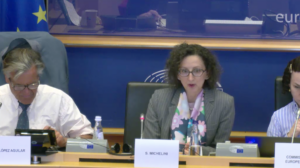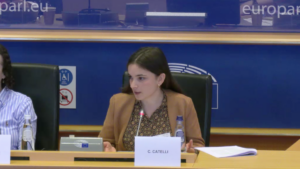
Brussels – It wasn’t just Hungary, nor just Cohesion Policy funds. Often left in the footnotes and footers and among the issues less in the public spotlight, the disbursement of EU funds related to Home Affairs programs closely involves compliance with some of the founding principles of the European Union. It is no coincidence that one of the horizontal enabling conditions for reimbursement of money already spent is that of compliance with the EU Charter of Fundamental Rights. In recent years, Cyprus, Poland, and Hungary have shown problems in implementing monitoring mechanisms against possible human rights violations. Still, other member states could also end up under scrutiny for how they spend EU funds in the area of migration and asylum.

“The European Commission realizes its role in protecting the Union’s budget in general and about Home Affairs in particular; member countries must verify compliance with conditions before they can be reimbursed for expenses,” explained the European Commission’s Director for Home Affairs Funds, Silvia Michelini, speaking at a hearing before the European Parliament’s Committee on Civil Liberties, Justice and Home Affairs (LIBE) this morning (March 19). Recalling that “our EU funds and programmes are subject to three horizontal enabling conditions” (compliance with public procurement rules, compliance with the EU Charter of Fundamental Rights and compliance with the UN Convention on the Rights of Persons with Disabilities), Michelini pointed out that “for Home Affairs we are particularly interested in the second one,” the one on respect for fundamental rights.
According to the rules of the Multiannual Framework 2021-2017, to be eligible to receive EU Internal Affairs funds—Asylum, Migration and Integration Fund(AMIF), Border Management and Visa Facility (BMVI) and Internal Security Fund (ISF)—spent through national programmes (as well as those of the Cohesion Policy), the twenty-seven countries must demonstrate that they are able to implement the Charter of Fundamental Rights. To prove this, they must have functioning mechanisms for reporting and accounting for potential cases of violations of the rule of law and human rights. If these mechanisms are not in place—as with Poland, Hungary, and Cyprus—the EU Commission can still approve the submitted programmes but not reimburse the money already spent. In other words, compliance with the horizontal enabling conditions (specifically the one on the Charter) concerns not only the stage of adoption of the programmes but the whole implementation process.

However, the issue is not so straightforward, as compliance with horizontal enabling conditions and their monitoring remains one of the most sensitive and least transparent issues in the management of EU funds. “It is an additional leverage on member states, which can mitigate the risk of misuse of EU funds, but the transparency of the whole process should be improved,” is the lunge of the Policy Office of the European Council for Refugees and Exiles (ECRE) Chiara Catelli: “In our opinion, there is a lack of clear criteria used to evaluate programs; it is not clear why in other cases programs were considered compliant.” One example is that provided by Greece, which “has a long history of fundamental rights abuses,” including European Court of Human Rights judgments on migration and asylum and infringement proceedings launched last year on EU-funded reception centres on Greek islands. “Explaining why these and other programs were launched would facilitate monitoring work,” Catelli pressed. An opportunity to already shed light on the “criteria and checklists applied in this case and others” by the Berlaymont services may be the one provided by the Commission’s referral to the EU Court of Justice from the parliament on the release of EU funds for Hungary.

The Policy Office of the European Council for Refugees and Exiles (Ecre) Chiara Catelli (March 19, 2024)
A final issue raised by the ECRE Policy Officer is related to both the future Migration and Asylum Pact near final approval by the co-legislators and the €2 billion increase in the budget related precisely to the implementation of the Pact by the Mid-term review of the EU budget 2021-2027. “More funds mean a greater need for monitoring because there are several areas of particular concern,” warned Catelli, speaking of an “increase in activities at the border” that new EU legislation will entail: “Funding should not end up at detention centres at the border, but can be used to strengthen the framework related to the monitoring of fundamental rights.” In other words, a use “in a positive way,” where, for example, “the BMVI also provides for assistance to vulnerable persons or legal aid, even if member states do not see these as a priority element in their national programs.”
English version by the Translation Service of Withub






